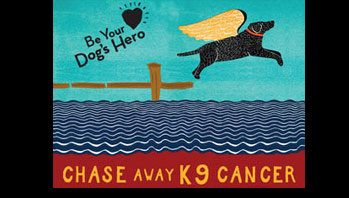 Since fewer and fewer veterinarians are opting to focus their careers on research it has become vital to support the role of the clinician scientist as they search for landmark discoveries and help shape the practice of veterinary medicine.
Since fewer and fewer veterinarians are opting to focus their careers on research it has become vital to support the role of the clinician scientist as they search for landmark discoveries and help shape the practice of veterinary medicine.
Thanks to the generous support of donors, Chase Away K9 Cancer is funding the second year of the Fellowship of Dr. Jennifer Ginn, DACVIM (Small Animal Internal Medicine) at the University of Wisconsin-Madison.
Lymphoma is the most common cancer in dogs and closely resembles Non-Hodgkins lymphoma in people. Although lymphoma is often initially responsive to chemotherapy, long term survival in dogs is rare.
Dr. Ginn is studying a gene called glutathione transferase (GST) in dogs with lymphoma. The GST gene encodes an enzyme (also called GST), which helps to rid the body of certain environmental toxins. When there is a mutation in this gene, the enzyme’s function is decreased or lost, and the body is exposed to a higher level of these environmental toxins, some of which can cause cancer. Mutations in the GST gene have been associated with lymphoma and many other types of cancers in people, most likely because the body is exposed to more environmental toxins that cause cancer.
The GST enzyme is also responsible for metabolizing chemotherapy drugs, so mutation of the GST gene may lead to a longer time that the drug remains in the body, making the drug more effective, but also more toxic. The goal of Dr. Ginn’s study is to identify the GST gene in dogs and to evaluate whether dogs with lymphoma have a higher frequency of mutations in this gene. They are also monitoring the progress of dogs with lymphoma that are treated with chemotherapy and looking to see whether mutations in the GST gene are associated with differences in survival time and toxicity to chemotherapy drugs.
When Dr. Ginn started her project about a year ago, her first goal was to find the GST gene in dogs. She has been able to isolate this gene and to prove that it exists and is active in the white blood cells that give rise to lymphoma (lymphocytes).
“Our hope is to discover a link between mutations in the GST gene and risk for lymphoma. This would support the idea that the body’s detoxification system plays a role in the risk of developing this cancer, and might help us to better understand any possible relationships between exposure of dogs to pesticides and other pollutants and the development of lymphoma. These results might also help us to design treatments to enhance this detoxification system, hopefully reducing the risk of cancer in dogs. An added benefit to this research is that lymphoma in dogs is similar to lymphoma in people, and the information we gain from this research may help people as well,” states Dr. Ginn.
Dr. Ginn continues, “I would like to thank all of the generous donors who have helped to fund this research. Behind all of the critical achievements in research that have moved us forward in our understanding of cancer is the funding that made it possible. Your support is crucial to the progress we are making to fight cancer in veterinary medicine, and I cannot thank you enough for this support.”
Stay tuned for more updates on Dr. Ginn’s study.






